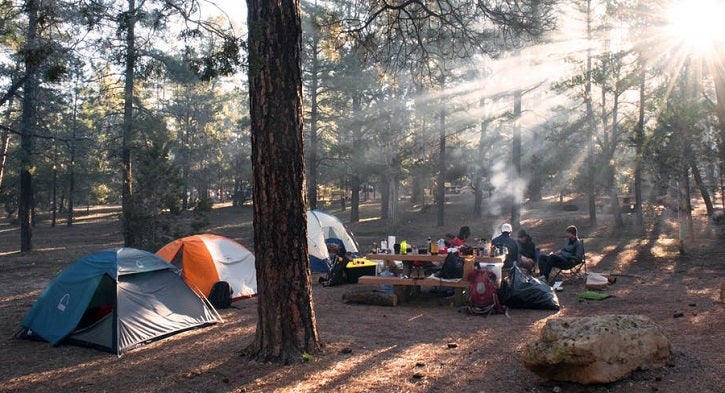
Our Editors independently research, test, and rate what we feel are the best products. We use affiliate links and may receive a small commission on purchases.
Itching to get out there in the wilderness camping? Or maybe just spending a few nights in a campground with all the amenities. Whether you are going to Yosemite National Park or Ft Wilderness at Disney World, either way you’re going to need some essential camping gear.
Whether you have never camped before or been deep in the wilderness the basics are the same, just the specific gear for your particular trip will most likely be different. This beginners guide to camping will set you off on the right foot.
How To Get Started Camping
Planning Your Trip
First thing to keep in mind is the type of camping trip you have in mind. Taking an RV or car to a campground with some short day hikes OR your packing your gear for an extended hiking trip will have radically different gear needs.
The difference between the two is the former is called “camping” while the latter is called “backpacking.” The Camper will usually drive to a campground and camp out of that location while the backpacker will hike in and then make their camp with what they have brought.
So the gear best suited is directly related to weight and portability or size. This is a crucial difference, make sure your buying gear for what you will be doing most of.
Gear for the backpacker normally be pricier because their primary concern is weight and portability, but it’s important for both camping and backpacking.
Buying gear that can be used for both will be your primary concern if you plan on backpacking AND camping. Consider your specific needs instead of going of a generic list of gear. However, the list of items that are essential, remains the same.
The Essential Camping Gear
 Well start with the most obvious equipment and that is; tents, sleeping bags and backpacks. This is all the costlier gear you’ve been putting off buying until you’re ready to go. It’s not as bad as you think, most camping gear has come down in price and you probably won’t need as much as you anticipate.
Well start with the most obvious equipment and that is; tents, sleeping bags and backpacks. This is all the costlier gear you’ve been putting off buying until you’re ready to go. It’s not as bad as you think, most camping gear has come down in price and you probably won’t need as much as you anticipate.
Tents, Tie Downs and Stakes
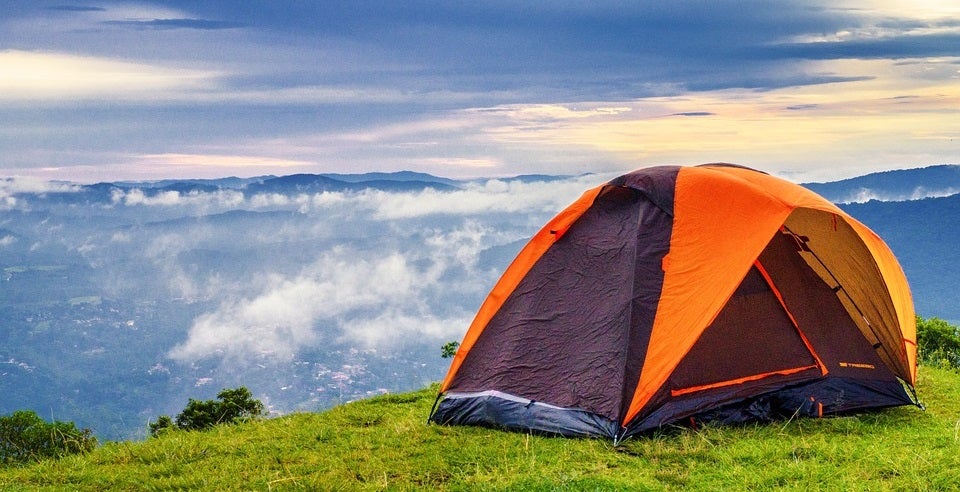
You’re going to need something to sleep in unless you have an RV, so a tent is your first priority. The same camping tent will of course not work for everyone. Tents come in many varieties of sizes and types.
While the ultralight tents are perfect for backpacking the person camping near their car might be better off with a bigger, heavier tent. If you are worried about setting up a tent, the new “pop up” tents can literately be taken out of the carry bag and setup in under a minute.
There are two major types of tents: three season and four season. The three season tent will be fine for most anything except for as you may have guessed, winter camping. While most of us won’t be camping in the winter, if that’s your thing, then be sure to get a tent rated as a four season. It will be made of a thicker more durable material.
The good news is that even the “cheaper” camping tents in the $200 to $300 range are pretty good nowadays. All these tents will come with the tie-downs and stakes. One other thing to consider, if there is any chance of rain or the ground being wet or damp, seriously consider a tarp to put down under your tent.
Now I haven’t personally done this BUT many people skip the tent entirely and just bring a hammock to sleep in. Now this is something I want to try as it has some BIG advantages.
Most important being weight. A camping hammock is measured in ounces while a tent is measured in pounds. Also portability and ease of setup, a hammock just needs a couple of trees and your good to go. I plan on trying this on my next trip.
Sleeping Bags And Pads
Just as tents come in various sizes and weights, so do sleeping bags. Again the time of year you will be going AND whether you are going backpack camping or in a tent at the campground will decide what you will need. There are many sleeping bags that are pretty good for “all around” camping and backpacking.
To get a decent sleeping bag, figure you’re going to have to spend somewhere between $75 and $150. And unless you are really roughing it, an air filled sleeping pad that goes between your sleeping bag and the ground will make for an immensely more comfortable night’s sleep.
Backpacks
The backpack you need will vary widely whether you are camping or backpacking. If you’re camping, then a small day pack is all you will need to keep some food, water and other accessories.
If your backpack camping, then size, weight and comfort is your primary consideration along with whether you are going overnight or long haul. This is an area where buying quality matters! Better to spend a little and get a good backpack, then go cheap and be miserable.
Flashlights, Lanterns and Headlamps
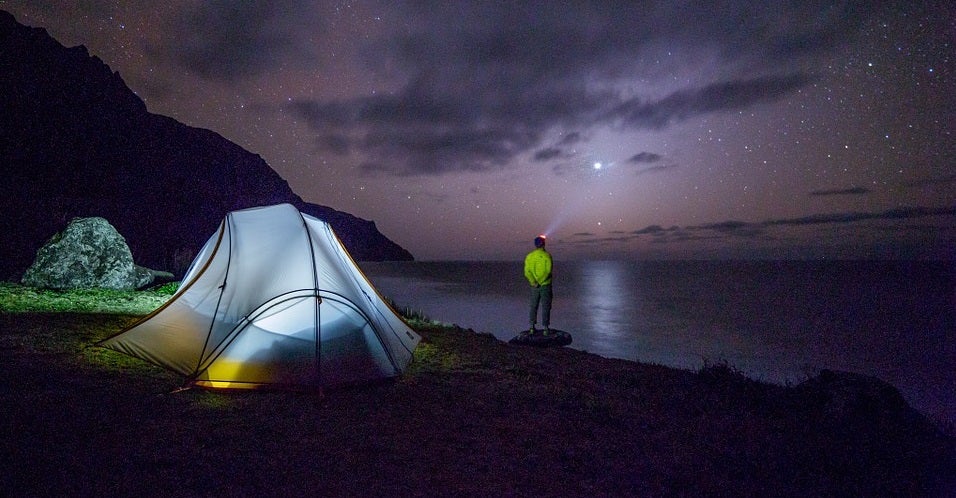
I know it may be hard to believe but it will get dark and you’re going to need something to find your way around; whether it’s to get another beer or see what that weird sound was. Make sure your buy a quality, sturdy LED flashlight.
If you want to read in your tent, having a lantern you can hang from the top of your tent is worth investing in. If you’re backpacking, having a headlamp is a great choice when you’re trying to setup your tent or trying to find a spot to go to the bathroom.
Water Filtration and Treatment Tablets:
Depending on where you are camping you probably have fresh water available but if you are backpack camping you will most likely not be able to bring enough fresh water with you. In this case you will need to bring along some type of water filtration solution.
The LifeStraw Mission Gravity-Fed Water Purifier is a great option. Its simple and cheap at only $50 from Amazon. Another option is treatment tablets, such as the Potable Aqua Treatment tablets. Ideally you should use both to not take any chances with your water.
Hiking Shoes/Boots
Your choice of wearing a shoe or boot is going to depend on several factors. For most people a quality hiking shoe (Women’s here)will be sufficient. Shoes will most likely be more comfortable and lighter so taking a long hike will be much less tiring. However if your hiking is going to be taking you through rough and or wet terrain then a hiking boot (Women’s here) will be a better choice.
A boot is going to offer much better ankle protection, stability and water resistance. Most hiking shoes are not water resistant as they are designed to wick sweat/moisture away and they can’t be water resistant for this reason. Our recommend hiking shoe for men is the and for Women the Merrell Women’s Moab Ventilator is a top pick.
Maps
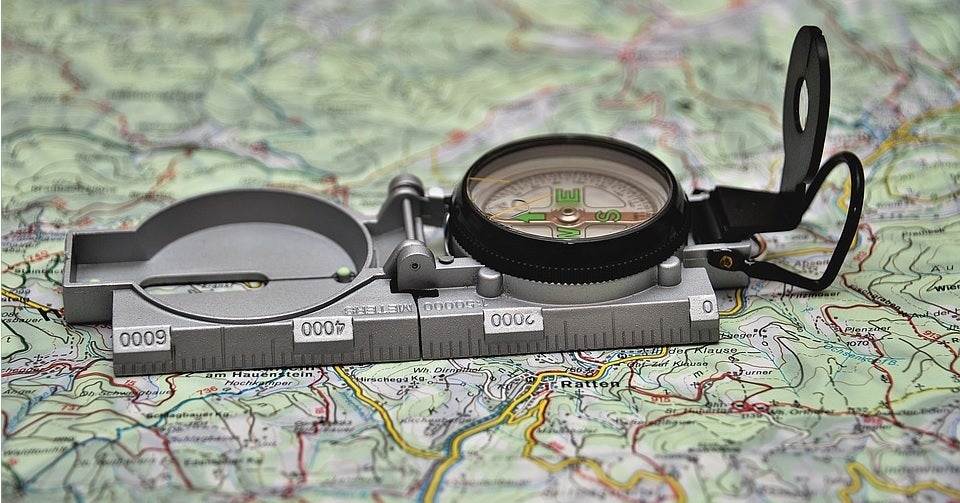
Camping lends itself to being in remote areas where there is the strong possibility of not having cell service. And if you’re backpacking then most definitely you’re not going to have it. So it would be a good idea to get a paper map of the area and have a good idea of how to read it and a compass for navigation.
If you don’t want to go that route a satellite GPS unit or even a GPS hiking watch is a viable option. Just be sure to have something! You can get some great topographical maps here.
First Aid Kit
This should be obvious that you need to have one. You don’t need to go overboard but make sure it has the essentials and has some hiking/camping specific things like aloe vera for burns or moleskin for blisters. Here is a good camping first aid kit to consider. Its also a good idea to get familiar with basic first aid procedures.
Cooking Essentials
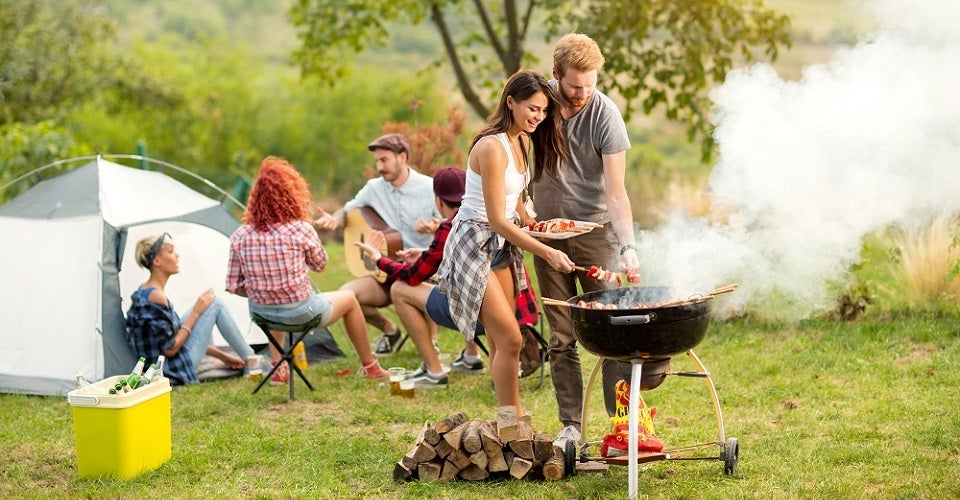
Living on peanut butter sandwiches is going to get old real fast so you’re going to need some way to good food, especially if you’re going to be fishing or hunting.
Camping Stove, Fuel and a Fire Starter
While you may be able to toast some marshmallows over the campfire, you’re going to want a real camping stove or grill for cooking purposes. For camping where your not lugging around stuff too far, then the basic Coleman Camping Stove is a good choice. A more powerful one like the Camp Chef Explorer is also a good option.
For very lite duty cooking a backpacking stove like the small light MSR PocketRocket stove will work for most people. If your looking for more durable and better quality then the Jetboil MiniMo is a better bet for you. If your not sure how much your going to be going, then it may make more sense to go cheap at first then upgrade as needed. Just don’t forget a fire starter or some matches.
Pots and Pans
If your going to be camping near your car, then you can save some money and just use the pots and pans from your kitchen. There is no real reason to have separate camping pot and pans unless you have some really nice stuff and don’t want to risk it getting lost or damaged.
Backpacking is a different animal, you will need cookware that is lightweight and packable. For a cheap effective solution the MalloMe Cookset will work fine. The GSI Outdoors Destination Cookware set has all the pots and pans you will need plus mugs, plates and bowls.
The cups, bowls and utensils for backing are designed to be lightweight, durable and have designs to allow them to be very compact. Add in the GSI Outdoors Destination Kitchen kit which has all the needed utensils and you will have everything you need to cook up a gourmet meal.
Coffee
I don’t know about you, but I cannot get going in the morning until I have at least one cup of coffee. Since it not an ABSOLUTE necessity, a small and light as possible design is needed. That’s where the AeroPress is a great inexpensive design. Be sure to bring pre ground coffee. I personally can’t stand it, but if you need coffee and don’t want to bring any sort of coffee maker then just bring some instant coffee.
Cleaning Gear
Even when if you’re in the middle of the wilderness you will still do wash dishes. You don’t need anything fancy here, just some type of dishcloth, scrub brush and don’t forget some trash bags. Whatever you take in, should come back with you.
One more important thing I haven’t discussed is food and meal planning. This is a whole other article. Backpacker has a good article on food planning. It will walk you through all the basics.
Don’t forget some liquor, beer is way to heavy. A flask or two of some good whiskey or bourbon will hit the spot after a long day hiking, fishing etc. Don’t forget a camping cooler of some sort if your going to have any perishables, especially if you’re going to be fishing.
Wrapping Up
One of your most important considerations for camping is the climate and the environment. Obliviously if you’re heading out in a desert, a rain coat will not be needed but if you’re going somewhere that rain is likely, without one you’re going to be miserable. If fishing is on the agenda, don’t forget to bring a fishing permit, pole and bait (or lures).
Video: Beginners guide to camping.
If it’s a biking and camping trip, then not only will you need to pack camping gear but also all the biking extras. The bottom line is, spend lots of time planning. Think about where you’re going vs what you will need. Check the long range weather forecasts. There are plenty of “check lists” for any type of camping you will be doing for any specifics.
Everybody will have somewhat different needs, consider any medications you take, hygiene products that are often forgotten. Carefully consider everything you are packing and if you will really need it. Over packing will bog you down, keep it to the bare essentials. Then when you get back, note things you wished had brought and what you didn’t need at all. So each trip will be a little better than the last one.
I hope this beginners guide to camping was helpful.. If you want to comment or recommend a tip or consideration I didn’t include, please use my contact form to get in touch.
Have fun and be safe out there!
